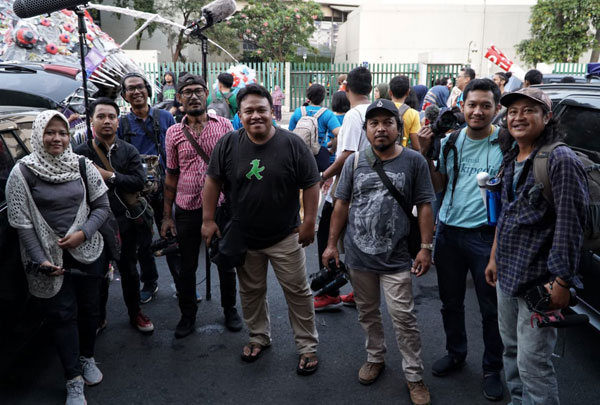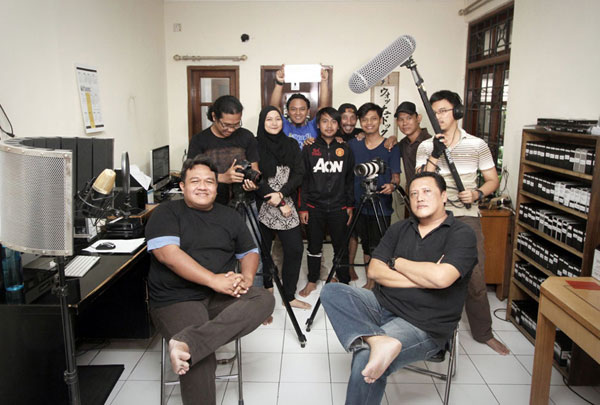[Interview] The Special Prize Winner of the 2021 Gwangju Prize for Human Rights
Watchdoc Documentary Maker

Q1. Please introduce your self.
A1. I am Panca, co-founder of Watchdoc Documentary Maker.Q2. Why did you start the movement for democracy and humanrights?
A2. We were restless about human rights violation and abandoned democracy in our country. So we make our moves, we want all the Indonesian community able to fulfill their economic and social as well as civil and political rights.Q3. When you heard about winning the Special Prize for Gwangju Human Rights, what did you first think?
A3. I was very surprised, it was unbelievable since we are nothing compare to human rights defenders and victims in Indonesia.Q4. How do you feel about winning the Special Prize for Gwangju Human Rights?
A4. I am honored and grateful knowing there is an international organization who acknowledged and appreciate our efforts all this time.Q5. What activities have you been doing?
A5. We are taking our place in the freedom of expression by producing documentary films and features.Q6. Did you do any other activities besides documentary production?
A6. We also facilitate capacity building trainings for communities and CSO to enable them to make good campaigns of human rights issues they are dealing with.Q7. What is the most important thing in the human rights movement?
A7. Protection of Human Rights defenders because without it human rights movement will be hard to improve.Q8. What was the most difficult thing during the human rights movement?
A8. There is no goodwill from the government to arrange laws or regulations on protection of human rights defenders. In reality, many of them were murdered, being terrorized, or criminalized in Indonesia.Q9. Tell me about the current human rights situation in Indonesia.
A9. In the last couple of years, human rights fulfilmlent is distracted particularly when it comes to freedom of expression.Q10. Do you know about the May 18 Democratic Uprising?
A10. Yes I do. It was a student a movement ended up as tragedy of humanity in 1980 in South Korea.Q11. How is it similar to the pro-democracy movement in Indonesia?
A11. It is similar to the movement of Indonesia reform in 1998.Q12. What film of work would you like to introduce the most to the work?
A12. Sexy KillersQ13. What is it about?
A13. The film is about political power and mining business in Indonesia. How oligarchy often violate economic and social as well as civil and political rights of the people.Q14. What influences you activities the most?
A14. The struggle of Indonesia’s human rights defender, Munir Said Thalib who was killed in 2004.Q15. What inspires you in the planning stage?
A15. The lack of human rights campaign on television and social media.Q16. When was the most rewarding time as a documentary producer?
A16. When there was many requests from communities and victims to preview our films and to discuss them over.Q17. Who was the most impressive person you met while producting your work?
A17. The victims of human rights violations.Q18. There must be many difficulties during filming. What is the driving force for you to continue your activities without giving up?
A18. The challenge to deliver the messages from the voiceless.Q19. As a human rights activist and documentary producer, what should you keep in mind?
A19. Mandate to keep on advocating the voiceless and to run profitable, proper, integrated organization at the same time. We have to keep the balance between the two interests without loosing our human rights perspective.Q20. What is the most important thign to you right now?
A20. Surviving and collaborating with many reputable and respected parties to promote human rights.Q21. Ho wmany employees are there now?
A21. 18.Q22. What are there role?
A22. Producers, reporters, camera person, editors, graphic designers, finance and administration, legal.Q23. What is the main value of Watchdoc’s works and what is it that you want to convey?
A23. Mankind are free, equal, and should respect each other.Q24. Do you have any goals that you would ultimately like to achieve through your current activities?
A24. The more effective humanitarian advocacy which is implemented by more parties to fill in as many influential social media platforms as possible.Q25. Is there anything you want to emphasize to Indonesians and Koreans for the development of democracy in Indonesia?
A25. Let us communicate, let us learn from each other, help each other to promote human rights and make the most of audio visual and social media as medium.Q26. What are your plans for the future?
A26. We would like to empower and to train as many people as possible to be able to produce their own videos and to collaborate. Not only the Indonesia people but Asian, and global communities as well.


